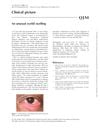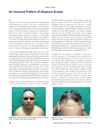 5 citations,
May 2005 in “Seminars in Plastic Surgery”
5 citations,
May 2005 in “Seminars in Plastic Surgery” Hair transplantation using micrografts and minigrafts is effective and safe for facial and scalp reconstruction with natural-looking results.
 3 citations,
December 2021 in “Dermatology reports”
3 citations,
December 2021 in “Dermatology reports” Dupilumab can improve both atopic dermatitis and alopecia universalis.
 3 citations,
January 2012 in “Elsevier eBooks”
3 citations,
January 2012 in “Elsevier eBooks” The document says that there are treatments for hair and nail diseases.
 3 citations,
May 2010 in “Nursing Standard”
3 citations,
May 2010 in “Nursing Standard” Treatments for autoimmune hair loss have limited success and often relapse, and emotional support is crucial for those affected.
 2 citations,
January 2022 in “Eduvest”
2 citations,
January 2022 in “Eduvest” A teenage girl with a fungal scalp infection got better with antifungal and allergy medication, and special shampoo.
 2 citations,
January 1997 in “Leprosy Review”
2 citations,
January 1997 in “Leprosy Review” A neglected leprosy treatment led to rare scalp hair loss in an Indian woman, which improved with proper medication.
 1 citations,
February 2013 in “Clinical pediatrics”
1 citations,
February 2013 in “Clinical pediatrics” The baby’s hair loss was due to a rare genetic condition, not treatable by usual methods.
 1 citations,
October 2012 in “QJM”
1 citations,
October 2012 in “QJM” A 47-year-old man's eyelid swelling didn't improve with basic treatments, so a biopsy was needed.
 1 citations,
May 2010 in “Nursing Standard”
1 citations,
May 2010 in “Nursing Standard” Treatments for autoimmune hair loss have limited success and patients need emotional support and self-acceptance.

Current treatments for alopecia areata often fail to achieve and maintain significant hair regrowth.
 January 2022 in “Eduvest”
January 2022 in “Eduvest” A teenage girl with a fungal scalp infection got better with antifungal and allergy medication, plus medicated shampoo.
 January 2018 in “Georg Thieme Verlag eBooks”
January 2018 in “Georg Thieme Verlag eBooks” Hair transplantation is a surgical procedure to move hair to bald areas, requires good donor hair, and results show in about a year.
 June 2017 in “Asian journal of pharmaceutical and clinical research”
June 2017 in “Asian journal of pharmaceutical and clinical research” Green tea extract gel safely increases eyelash length.
 January 2014 in “International Journal of Trichology”
January 2014 in “International Journal of Trichology” A man had an unusual type of hair loss that didn't match known patterns and didn't improve with treatment.

Human scalp hair follicles have PGE2 and its receptors, which might affect hair growth.
 January 2012 in “Elsevier eBooks”
January 2012 in “Elsevier eBooks” Hair loss can cause emotional and social issues, and various treatments, including medication, surgery, and psychological support, are needed.
 300 citations,
August 2012 in “Seminars in Cell & Developmental Biology”
300 citations,
August 2012 in “Seminars in Cell & Developmental Biology” The conclusion is that certain cell interactions and signals are crucial for hair growth and regeneration.
 209 citations,
September 2008 in “Dermatologic Therapy”
209 citations,
September 2008 in “Dermatologic Therapy” Androgens can both increase and decrease hair growth in different parts of the body.
 180 citations,
November 1991 in “American Journal of Psychiatry”
180 citations,
November 1991 in “American Journal of Psychiatry” Fluoxetine was not effective in treating hair-pulling disorder in the short term.
 157 citations,
April 1994 in “Clinical endocrinology”
157 citations,
April 1994 in “Clinical endocrinology” Androgens can cause hair growth in some areas and hair loss on the scalp.
 151 citations,
February 2007 in “International Journal of Dermatology”
151 citations,
February 2007 in “International Journal of Dermatology” Alopecia areata causes hair loss, has no cure, and various treatments exist.
 147 citations,
April 1994 in “Drug Safety”
147 citations,
April 1994 in “Drug Safety” Some drugs can cause hair loss or increase hair growth, but these effects are usually reversible when the drug is stopped.
 114 citations,
March 2002 in “Current opinion in oncology/Current opinion in oncology, with cancerlit”
114 citations,
March 2002 in “Current opinion in oncology/Current opinion in oncology, with cancerlit” Cancer therapy can cause various skin problems, including hair loss, skin darkening, painful hand-foot syndrome, and severe skin damage.
 107 citations,
December 2013 in “International Journal of Dermatology”
107 citations,
December 2013 in “International Journal of Dermatology” The document concludes that hair is complex, with a detailed growth cycle, structure, and clinical importance, affecting various scientific and medical fields.
 85 citations,
April 2007 in “Dermatologic Clinics”
85 citations,
April 2007 in “Dermatologic Clinics” Some drugs can cause hair loss, change hair color and shape, or increase hair growth, and treatment may involve stopping the drug or using specific hair growth treatments.
 84 citations,
April 2005 in “Dermatologic Clinics”
84 citations,
April 2005 in “Dermatologic Clinics” Treatments for melanin disorders exist, but more effective options needed.
 83 citations,
January 2001 in “American journal of clinical dermatology”
83 citations,
January 2001 in “American journal of clinical dermatology” Clomipramine may significantly reduce hair-pulling in Trichotillomania, but more research is needed on treatments and early onset cases.
 69 citations,
January 2013 in “Frontiers in Immunology”
69 citations,
January 2013 in “Frontiers in Immunology” The FOXN1 gene is crucial for developing immune cells and preventing immune disorders.
 68 citations,
May 2012 in “Annals of Oncology”
68 citations,
May 2012 in “Annals of Oncology” Some breast cancer chemotherapy can cause permanent hair loss.
 67 citations,
May 2010 in “Journal of The American Academy of Dermatology”
67 citations,
May 2010 in “Journal of The American Academy of Dermatology” Some chemotherapy can cause permanent hair loss.






























